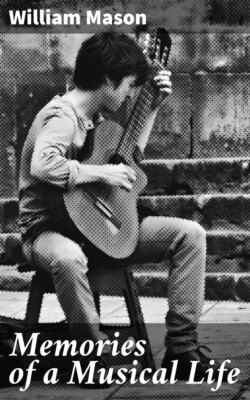Читать книгу Memories of a Musical Life - William Mason - Страница 5
На сайте Литреса книга снята с продажи.
LOWELL MASON'S CAREER
ОглавлениеTable of Contents
THE success of my father's first venture led him to leave Savannah and settle in Boston. Then, as now, the Handel and Haydn Society was largely recruited from church choirs, but in those days its concerts were few, and these were almost entirely devoted to church music. Rarely was a "work" offered to the public. Outside the realm of church music, the society's repertory consisted of "The Messiah", "The Creation" (and more frequently fragments from these), the "Dettingen Te Deum" by Handel, and the "Intercession" by M. P. King, who has long since been forgotten. For five years my father was president of the society, and served as musical director, the special employment of a conductor not having been authorized until 1847.
Meanwhile he was constantly aiming at the introduction of popular education in music. It was through his efforts—and strenuous efforts they were—that music was introduced into the Boston public schools. To bring this about he first taught classes of children free of charge, and gave concerts to illustrate the practicability of his plans. When finally musical education was made a part of the Boston public-school system, the city council refused to make any appropriation for it, and he served as instructor for a year gratuitously, beginning work in 1837 in the Hawes Grammar School, South Boston. The experiment was a complete success. Music was generally introduced into the public schools, and my father was made superintendent of the department. The seeds he sowed then are still bearing fruit. This was part of his labor which created in Boston a self-developing musical activity. While Dr. Samuel G. Howe was engaged in organizing the Perkins Institution for the Blind in 1832, at his request my father devised a system of musical instruction for the blind.
